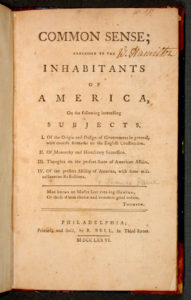This Week’s Selected Media: Common Sense, by Thomas Paine; Atlas Hugged, by David Sloane Wilson; and the latest What Is Politics? video
This week I read, listened to, and watched:

Common Sense, by Thomas Paine: As long as I’ve been reading Locke, Common Sense made sense too. I enjoyed the digs at George III and its at times casual style. I had to remind myself he was rebelling against the most powerful nation in the world, taking personal risk.
It’s easy for me to take for granted the U.S. government and democracy and forget how radical and new it was when it formed. As far as I know, nothing like it existed before at that scale. Europeans had been exploring what structure a government could have, but mostly in theory. Then people put it into practice. Who would have guessed it would work this long and become a template for so many other governments.
I figure as a person who wrote the document, Paine studied government more than most. Still, it reads like he expected his audience to know how governments could be structured and why.
Atlas Hugged, by David Sloane Wilson: After I posted about reading Atlas Shrugged, a reader recommended Atlas Hugged. I looked up the writer. He’s an evolutionary biologist who objected to Ayn Rand’s philosophy of selfishness. He saw the value she got from writing fiction, so took her on with a work of fiction promoting group collaboration based on his evolutionary theory.
The fun part of the book is his openly deriding and satirizing her, using her characters against her. I think he melodramatized his characters to match and make fun of her style, but as that practice made her book less appealing, more wooden, so it did with his. Her book also just made up outcomes she ascribed to the characters’ values, so the actions of the ones she liked created good outcomes and those of the ones she didn’t like creating bad outcomes. But would things happen like she wrote if people behaved that way in life? Maybe sometimes, but not always. This book suffered that problem.
It reminded me of Isaac Asimov’s first Foundation book, which someone also recommended to me. I didn’t like it. Asimov’s book read like a fantasy of someone who doesn’t know how politics or relationships work and makes up big confrontations that control the state of the galaxy. Like Asimov and Rand, Atlas Hugged also reads like a fantasy of someone who dreams scientists can win over the world mostly by sharing facts and theory, a strategy I find counterproductive.
Lizard People: When Social Control Masquerades as Social Justice, the latest What Is Politics? videocast: I always recommend this podcast guest‘s visual essays. This time he starts by taking on equality versus equity. He generalizes to how race issues of inequality and vague words distract us from the most meaningful inequalities: economic and politics—that is, decision-making in groups.
I recommend it. If I haven’t led you to watching his whole series, I recommend the whole series.
Read my weekly newsletter

On initiative, leadership, the environment, and burpees